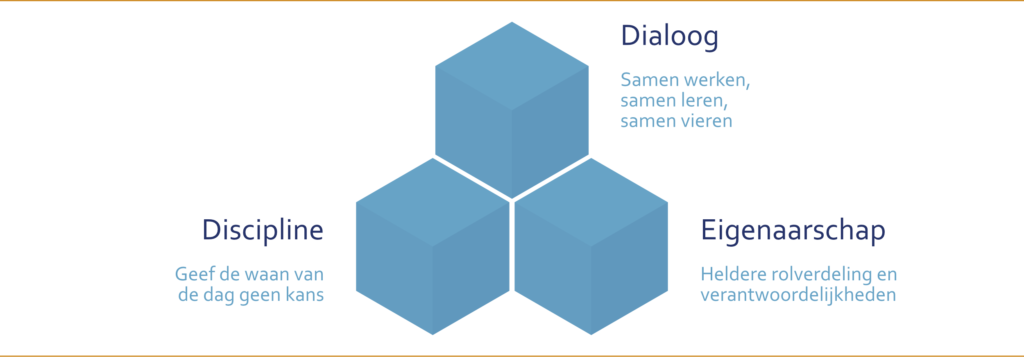Awareness
As an organization, department or you want to make conscious choices where you spend the scarce amount of time and money. This applies when drafting your OGSM, but also during implementation. An action that does not go according to plan is not necessarily a bad thing, as long as you are aware of the causes so that you learn from it. Changing your plan is not necessarily a bad thing, as long as you do it consciously to get better or faster results. This awareness of a team prevents you from being lived by questions from your environment (“We don't get around to our own work”) and ideas that pop up.
You create this awareness through dialogue, ownership and discipline.

Dialogue
OGSM is a model for writing down a plan in a sharp, concrete and concise manner. In PowerPoint or Excel this results in a boring table. "We're not going to tick off lists, are we?" the response is: "We are all about people." This reaction is based on a contradiction between lists and people. As if recording goals and actions is simply about executing and checking. It was not! Any plan is outdated in no time. Circumstances change, insights change and actions are just a little different than you thought. So you should regularly enter into a dialogue with each other:
- “How is it that an action does not go well? What can we do together to improve it? ”
- “What do we think of the result of our actions? What should we keep doing and what should we do differently? ”
- “What are our results? Let's celebrate! ”
Precisely because the plan has been established, you can enter into this dialogue with each other. The 'lists' ensure that you are talking about the right things.
Ownership
Every strategy and action must have one owner. So it is not a team or department, but a person. Because if everyone is the owner, in practice no one is the owner.
The owner is responsible for the content and is the point of contact for the team. The owner ensures that the status of the strategy or action is recorded. He also determines what he thinks of this status: are the signals on green, orange or red?
Discipline
Regular dialogue to increase team awareness is not easy. Soon you will be lived by the daily routine and months have passed without even looking at your plan. Implementing your plan requires a great deal of discipline to record progress, reflect regularly on the plan, stick to the agenda, and update your plan. A fixed working method helps you to apply this discipline. Once the process is fixed, you can focus more on the content.


